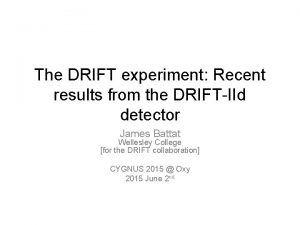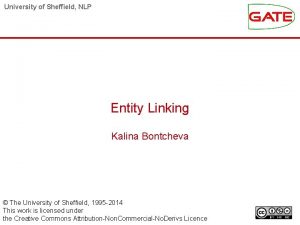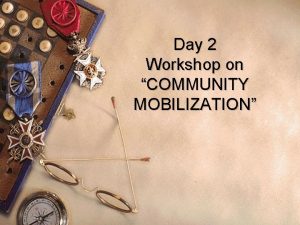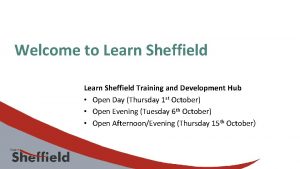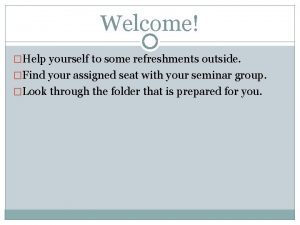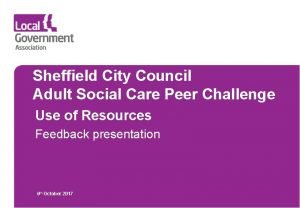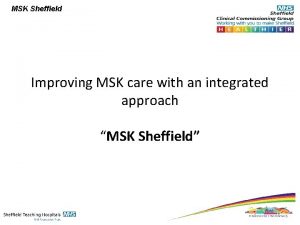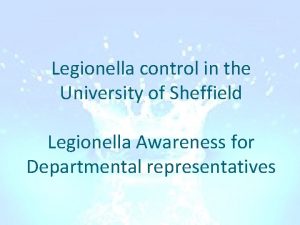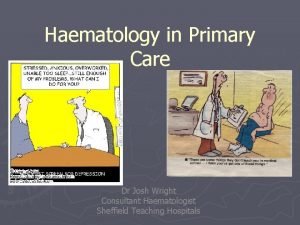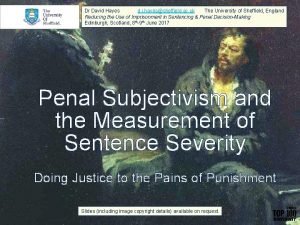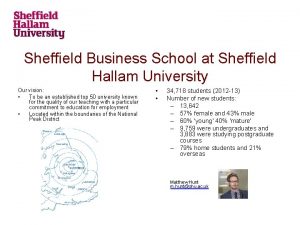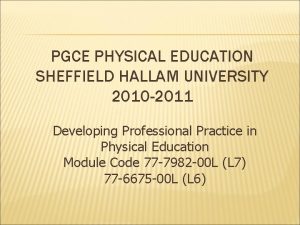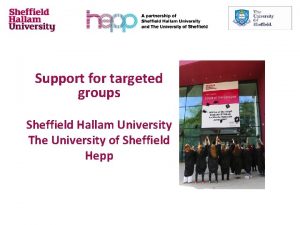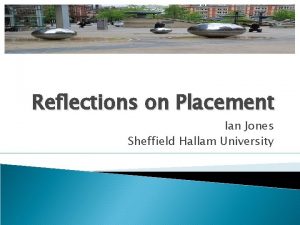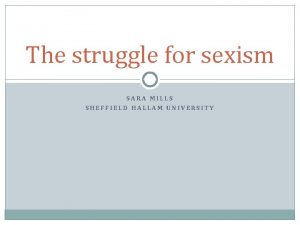Selfassessment at Sheffield Hallam University Education Community of

















- Slides: 17

Self-assessment at Sheffield Hallam University Education Community of Practice 23 & 24 October 2003 Eurocontrol, Brussels CAROL STEED Assistant Director Centre for Integral Excellence Sheffield Hallam University, UK © Centre for Integral Excellence Sheffield Hallam University http: //integralexcellence. shu. ac. uk http: //excellence. shu. ac. uk

Once upon a time…. . • Started life as a technical college • Became a polytechnic in 1969 (Sheffield Polytechnic renamed in 1976 as Sheffield City Polytechnic) • Became a ‘new’ University in 1992 (Sheffield Hallam University) • Today: – 28, 249 students – 3, 266 staff • 2 main campuses: – City Centre (handy for the shops and cafés!) – Collegiate Crescent - 1½ miles from the City Centre (leafy site with trees and squirrels!) – 3 rd campus 3 miles away (planned for closure) © Centre for Integral Excellence Sheffield Hallam University http: //integralexcellence. shu. ac. uk http: //excellence. shu. ac. uk

Our journey towards Excellence 1997 – Diana Green’s white paper 1999 – Mike appointed (Director of Quality / Director of Organisational Excellence) University wide assessment undertaken 1999 – First assessor training course held and first selfassessment undertaken 2000 – GMP 143 began (CS appointed to OE) 2000 – More self-assessments across schools and departments 2001 – First Mirror of Truth conference, two more followed 2001 – Organisational Development Programme began – process and change management © Centre for Integral Excellence Sheffield Hallam University http: //integralexcellence. shu. ac. uk http: //excellence. shu. ac. uk

Our journey (cont. ) 2002 – Continued self-assessments and started in new areas, continued internal training and development activities 2002 – Organisational Development Programme delivering range of improvement projects, including high level process definitions 2002 – Methodology developed to include Matrix approach. 2002 – Self-assessments continued, further development and refinement of methodology, tools and techniques for selfassessment (6 academic schools, 5 central departments, 3 research centres) 2003 – Work continues on embedding excellence concepts (future visioning and shaping) rather than focusing on selfassessment 2003 – Centre for Integral Excellence launched © Centre for Integral Excellence Sheffield Hallam University http: //integralexcellence. shu. ac. uk http: //excellence. shu. ac. uk

Self-assessment options Supported by Evidence AWARD ENTRY DATA PROFORMA WORKSHOP PROCESS RIGOUR LOW MATRIX HIGH QUESTIONNAIRE © Centre for Integral Excellence Sheffield Hallam University Based on Opinion Copyright EFQM http: //integralexcellence. shu. ac. uk http: //excellence. shu. ac. uk

Self-assessment method data gathering Self-assessment team using pro-forma Business Driver Questionnaire Customers & suppliers © Centre for Integral Excellence Sheffield Hallam University http: //integralexcellence. shu. ac. uk http: //excellence. shu. ac. uk

Pro-forma approach © Centre for Integral Excellence Sheffield Hallam University http: //integralexcellence. shu. ac. uk http: //excellence. shu. ac. uk

Questionnaire approach • Questionnaire used to establish an initial University wide assessment in 1999 • Pro-forma supported by BQC Performance Management Business Driver questionnaire at business unit levels to gain staff involvement and balance management and staff opinion © Centre for Integral Excellence Sheffield Hallam University http: //integralexcellence. shu. ac. uk http: //excellence. shu. ac. uk

Matrix approach • Series of statements incorporating RADAR principles • Used in 3 institutions across the UK to undertake institution wide assessments during 2002 • Used in a number of institutions across the UK to undertake unit based self assessments 2002/03 © Centre for Integral Excellence Sheffield Hallam University http: //integralexcellence. shu. ac. uk http: //excellence. shu. ac. uk

Impact for the University © Centre for Integral Excellence Sheffield Hallam University http: //integralexcellence. shu. ac. uk http: //excellence. shu. ac. uk

Impact levels Regardless of where self-assessments are taking place, the whole Excellence approach is having an impact at 3 levels: – Strategic (institution wide) – Strategic (business unit - school, department etc. ) – Operational (team based improvement projects within business units) © Centre for Integral Excellence Sheffield Hallam University http: //integralexcellence. shu. ac. uk http: //excellence. shu. ac. uk

Strategic Impacts University wide • Clear recognition of the need for process identification and management – much work undertaken in this area, including the development of University wide process map • Leadership and management development issues are being surfaced and addressed through a development programme • Internal communication across all boundaries is seen as key – Director of Communication now in post • Recognition of the need for better partnership working • Balanced set of measures and targets are needed and being incorporated as part of planning process • Better feedback and listening to ‘the customer’ – action plans expected from staff and student survey results • Provides a view of University from a ‘management’ perspective © Centre for Integral Excellence Sheffield Hallam University http: //integralexcellence. shu. ac. uk http: //excellence. shu. ac. uk

Strategic Impacts Business Unit • As for University wide in many cases in terms of recognising the significance of processes, management development, partnership working, KPIs and feedback etc. • Surfacing issues of efficiency and effectiveness in the way things are done and helping them to be looked at differently – can change and life is still OK • Greater focus on managing and planning the business at a strategic level, rather than just operational and academic management • Change in mindset of both administrators and academics - given a new united voice and common language © Centre for Integral Excellence Sheffield Hallam University http: //integralexcellence. shu. ac. uk http: //excellence. shu. ac. uk

Operational Impacts Team based • Many operational projects are underway • Examples include: – introduction of complete process management infrastructure – Process improvements e. g. timetabling, enrolment, admissions etc. – Changes to team structures based on recognition of processes and efficiencies that can be achieved – change to the way customer feedback is gained – ‘account managers’ allocated – improved business plans now being submitted and accepted – data from staff and student surveys integrated more usefully in future planning activities – development of more cross-team working projects – greater involvement and engagement of staff in process improvement activities – training and development provided in new skill areas for staff – partnership working between parts of institutions who may not previously have engaged together © Centre for Integral Excellence Sheffield Hallam University http: //integralexcellence. shu. ac. uk http: //excellence. shu. ac. uk

Initial conclusions • The use of the EFQM Excellence Model, with some adaptation and interpretation, is working in the HE sector • The learning can be accessed at any level, and through any part of the model (processes, results, leadership etc. ) • Self-assessment is a useful initial tool to aid the identification of key action areas, which can be by-passed once enough learning has been gained, but needs to remain as part of the monitoring framework as part of the planning process • At an organisation wide level, it is not a quick fix solution - but a catalyst for driving organisational change • At a business unit project level, it makes real improvements fast but long run this will be limited unless it is part of wider level improvements © Centre for Integral Excellence Sheffield Hallam University http: //integralexcellence. shu. ac. uk http: //excellence. shu. ac. uk

Initial conclusions (cont. ) • Other management tools, models and auditing frameworks can be used synergistically with the Model • The key to linking all these together is having a clear approach to process identification and management, supported by values based leadership, a partnership approach, clear communication channels, and a balanced set of KPI’s. • A comprehensive and integrated planning process, which considers both ‘quality’ and ‘business’ management is needed to monitor progress and ensure all aspects are reviewed and improved on an on-going basis. © Centre for Integral Excellence Sheffield Hallam University http: //integralexcellence. shu. ac. uk http: //excellence. shu. ac. uk

The Excellence Journey Excellence Organisational Development Process Management Corporate Scorecard Goal Deployment Personal Development Customer and Supplier Relationship Management Partnership & Collaboration Learning Organisation Business Plans & Self-Assessment Action plans Strategic tool Planning tool Integration & alignment Health check Maturity of organisation © Centre for Integral Excellence Sheffield Hallam University http: //integralexcellence. shu. ac. uk http: //excellence. shu. ac. uk
 Brittany hallam sudbury
Brittany hallam sudbury Wellesley
Wellesley Kalina bontcheva university of sheffield
Kalina bontcheva university of sheffield University of sheffield thesis
University of sheffield thesis Evaluate together in community mobilization
Evaluate together in community mobilization Sheffield development hub
Sheffield development hub Airhouse sheffield
Airhouse sheffield Sheffield nlp
Sheffield nlp Susan cartwright sheffield
Susan cartwright sheffield Stephen betts sheffield
Stephen betts sheffield Step out sheffield
Step out sheffield Stit sheffield
Stit sheffield Msk sheffield
Msk sheffield Legionella risk assessment sheffield
Legionella risk assessment sheffield Dr nat wright
Dr nat wright Glyn williams sheffield
Glyn williams sheffield David hayes sheffield
David hayes sheffield Jodi sheffield
Jodi sheffield

